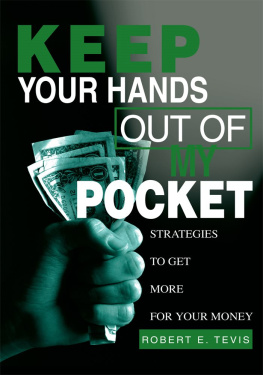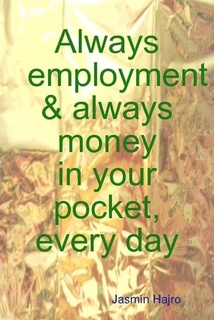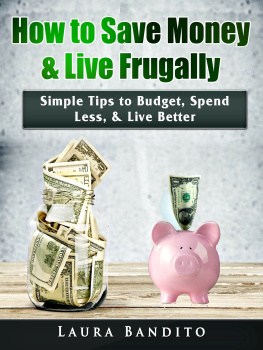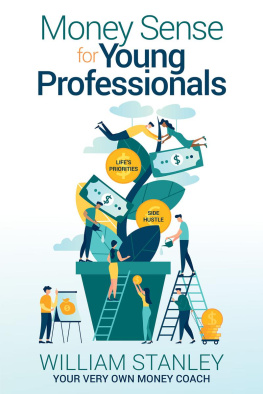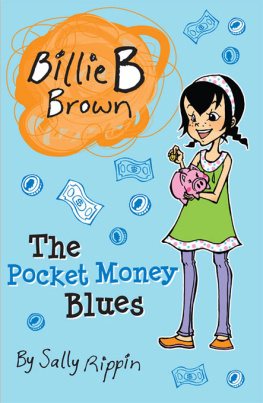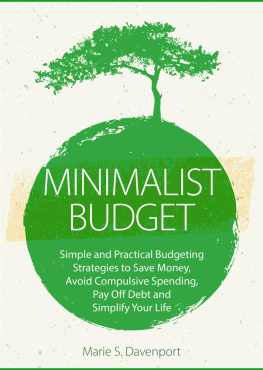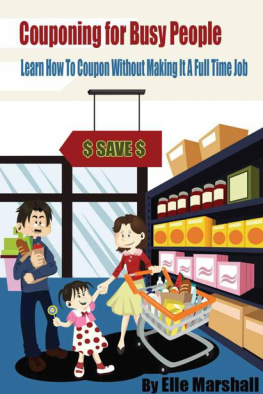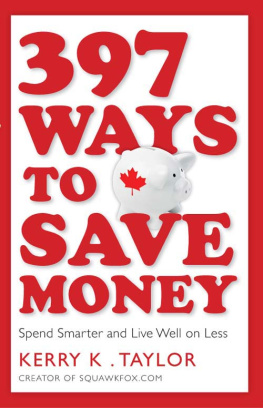Keep Your Hands Out
of My Pocket
Strategies to Get More for Your Money
Robert E. Tevis
iUniverse, Inc.
New York Lincoln Shanghai
Keep Your Hands Out of My Pocket
Strategies to Get More for Your Money
All Rights Reserved 2003 by Robert E. Tevis
No part of this book may be reproduced or transmitted in any form or by any
means, graphic, electronic, or mechanical, including photocopying, recording,
taping, or by any information storage retrieval system, without the written
permission of the publisher.
iUniverse, Inc.
For information address:
iUniverse, Inc.
2021 Pine Lake Road, Suite 100
Lincoln, NE 68512
www.iuniverse.com
ISBN: 0-595-28300-4 (pbk)
ISBN: 0-595-65756-7 (cloth)
ISBN: 978-1-4697-2753-0(ebook)
Contents
1
Keep Your Hands Out of My Pocket
2
Dont be Afraid to Negotiate
3
Assume People Are Ready to
4
Start at the Right Price
5
Look Beyond Price to Be a Better Negotiator
6
Prepare to WinTwice!
7
Avoid Major Sales Traps
8
Keep Your Mouth Shut!
9
Succeed with a Great Plan
10
Master these Negotiation Techniques to Win
11
Practice, Practice, Practice
This book is dedicated to my parents who worked hard for my education
and to my wife who inspires me to use my education every day.
1
Keep Your Hands Out of My Pocket
Do you ever get the feeling that everyones after your money? Its true.
People involved in sales are constantly looking for ways to separate you from your hard earned cash. Sellers of high-priced goods and services are constantly receiving training from their on-the-job experience, as well as books and formal classes, on ways to trade their offerings for your cash or credit. Great salespeople are able to just reach right into your pocket and take all that you have to give.
Sometimes, they reach in with the subtlety of a pickpocket. You happily drive your new car away blissfully unaware that the dealer has taken you for a few thousand dollars more than you really had to pay. Imagine if you could have the car and keep the few thousand dollars for yourself. If you bought it on credit, imagine a lower monthly payment.
Dont get me wrong. These people are not out to rob you. They just want to get as much as they can for their product and service. They are people, just like you, who are trying to earn whatever they can to support themselves and their families. In fact, you might be in a sales profession yourself. This is nothing to be ashamed of.
In fact, salespeople are an integral part of the engine that drives our economy. I have worked for almost 25 years with salespeople in some of the top Fortune 500 companies. I have participated in sales training where some of the best salespeople in the technology business are trained to answer their customers objections. This is another way of saying you must continue selling, even if your customers first response is no. Its their job to sell and earn what they can from a buyer.
Regardless of your profession, at one time or another, you also function as a buyer. The seller forms only the first half of the equation we call a free market. The other half is the buyer. A free market needs both a seller and a buyer who can freely act on their own behalf to transact a deal.
Buyers, however, often forget their responsibility to the free market, and act on behalf of the seller. They do this every time they buy something without question. Without buyers, acting on their own behalf, sellers can dictate the price and demand whatever they want. A good buyer performs a valued service in the marketplace by keeping prices for good ands services within reason.
Buyers, who routinely buy cars for $20,000, may see the price of cars slowly creep up towards $30,000; but buyers who stop buying at $30,000 will definitely see prices move downward toward $20,000. This is how buyers, interact with sellers, to make the modern marketplace work. This is the ebb and flow of the market.
The market is also helped by buyers who save some money from a single purchase and now have more money to spend somewhere else. In fact, you dont need a lesson in economics to know that its good to save money on everything you buy. The adrenaline rush you get from keeping the money in your pocket will tell you all you need to know. The question is how you can win at a game that is clearly tilted in our society toward the seller.
The answer is that you need to develop your ability to negotiate. No one is born with this skill, but everyone can learn it. This book will give you the simple concepts you need to help you keep a lock on your pocket. Its your money. You should have the skills and knowledge to hold onto it as long as you can.
If you are like most people, you probably never gave a thought to learning how to negotiate. Most negotiation books are written for the sellers. Negotiation experts sell their experience to the people involved in sales or other business professions. After all, this is how the greatest salespeople in the world become great salespeoplethey become great negotiators. Top sellers need to convince buyers that they have the absolute best product at the absolute best price.
To remain on top, professionals understand that they need continuous education and training. Most buyers never become professional at buying. They remain amateurs. They do not take the time to learn and practice what they learned. Unfortunately in the marketplace, buyers pay for this all the time. Its unfair that professionals receive this training and the amateurs, the buyers, learn nothing about it. If sellers have great tools to use to get you to buy something, buyers should also take a moment to get some great tools to even the score.
You would think that since you are destined to spend a huge portion of your life buying things, that teachers would have added negotiation skills to the reading, riting, and rithmetic lessons. Unfortunately, basic education has left out negotiation training.
I learned that you need to reach out and get this training on your own. I read the books and listened to the tapes. The major companies I worked for were kind enough to send me to live lectures with some of the best teachers in the area of negotiation skills. My MBA provided me with additional lessons, but you soon reach a point where you have to put all this knowledge to work.
As a manager in a large international company, I often had to pick up the phone, contact an employee who I never met, and convince that person to drop whatever he or she was doing and do something for me. That person could be in a foreign country, thousands of miles away. I had only a few seconds to introduce myself and convince the stranger that I needed help to get the job done. I always got the help I needed. While it is obvious that good communication skills were helpful, the negotiation skills I developed were essential to get the job done.
Most importantly, the same skills that I would use in my job, the same ones that I would share with our salespeople when I would consult with them, also worked extremely well in my personal life. They helped me get my home, my car, and most of the significant purchases I made. I simply applied the knowledge of how to negotiate to my everyday life. I proved to myself that good negotiation skills do pay off.
In fact, my wife constantly gets requests for my time to help someone we know go shopping. While Im glad to help, the most rewarding times are when I am able to teach my friends and family how to use these concepts themselves. Anyone can learn to negotiate and get what they want for less.
About a year ago, an old tree was threatening to fall on my mothers property. Insects and disease had taken its toll on the tall, decades old oak. Like most people, my mom called a local tree service to have the tree taken down. She called to tell me that she was disgusted at what it costs to remove an old tree. When I found out I was disgusted as well.
Next page
